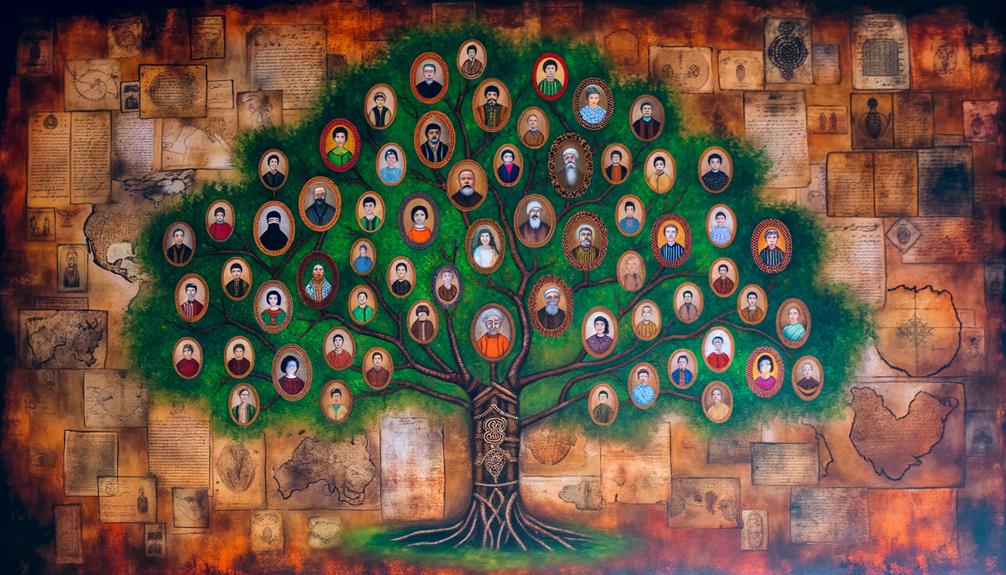Ramos Name Meaning in English
The surname Ramos originates from medieval Spain and Portugal, deriving from the Latin term "ramus," which means "branch." This toponymic name often indicated individuals who lived near a branch or thicket. Historically significant in regions like Castile and Andalusia, it was associated with nobility and military roles during the Reconquista.
Geographically, Ramos is common in Spain, Portugal, and Latin America, reflecting a rich cultural heritage. The name signifies a legacy of leadership and excellence, from medieval times to modern figures in sports and politics.
Discover more about its historical and cultural resonances.

Key Takeaways
- The name Ramos originates from the Latin word 'ramus,' meaning 'branch.'
- It signifies resilience, excellence, and a lineage of impactful individuals.
- Historically linked to Spanish nobility and agriculture in medieval Spain.
- Symbolizes heritage, familial pride, and social identity in Iberian cultures.
- Associated with leadership qualities and notable figures in sports and politics.
Origins of Ramos
Rooted in Iberian history, the surname 'Ramos' traces its origins back to medieval Spain and Portugal, where it was often associated with individuals who lived near a branch or a thicket. This geographical linkage indicates that the name was topographic, referring to the natural environment surrounding the bearers' dwellings.
During the Reconquista, a period marked by the Christian reclamation of the Iberian Peninsula from Muslim rule, surnames became instrumental in identifying families and their landholdings. The widespread adoption of 'Ramos' reflects its utility in describing notable landscape features.
Additionally, the surname's proliferation can be attributed to the movement of populations across regions, further embedding it into the social fabric of Iberian communities, and eventually, spreading to the Americas during the age of exploration.
Etymology of Ramos
The etymology of 'Ramos' traces back to the Latin word 'ramus,' meaning 'branch,' reflecting the surname's descriptive nature tied to the physical landscape. This connection to 'branch' suggests an origin linked to arboreal features or individuals residing near tree-laden areas. Historically, Latin played a pivotal role in shaping surnames across Europe, particularly in Romance languages. 'Ramos' emerged as a surname in regions where Latin influence was profound, such as Spain and Portugal.
| Origin | Language | Meaning |
|---|---|---|
| Latin | 'Ramus' | Branch |
| Spanish | 'Ramos' | Branches |
| Portuguese | 'Ramos' | Branches |
| Italian | 'Ramo' | Branch |
| French | 'Rameau' | Branch |
This analysis underscores the linguistic and cultural evolution that has cemented 'Ramos' in historical nomenclature.
Historical Significance
The historical importance of the surname Ramos can be traced back to its Spanish ancestry roots, where it was often associated with nobility and prominent lineages.
This surname not only signified social status but also played a vital role in the geographic distribution of families across Spain and its colonies.
Analyzing the historical records, one can observe that the name Ramos was not only a marker of heritage but also of regional influence and power.
Spanish Ancestry Roots
Tracing back to the Iberian Peninsula, the surname Ramos holds significant historical relevance within Spanish ancestry. This surname is derived from the Spanish word for 'branches,' symbolizing familial connections and growth.
Historical records indicate its prevalence in medieval Spain, particularly in regions like Castile and Andalusia. The etymology suggests a connection to nature and agriculture, reflecting the agrarian society of early Spain.
Additionally, the surname's distribution in historical documents aligns with the socio-political landscape of the Reconquista, where it surfaced among Christians reclaiming territories. This context underscores the name's deep-rooted heritage and its evolution alongside Spain's historical transformations.
The surname Ramos serves as a tribute to the enduring legacy of Spanish ancestry.
Nobility and Lineage
Ramos, a surname intertwined with Spanish nobility, has historically been associated with esteemed lineages and prominent familial estates. Esteemed families bearing the Ramos name often held significant influence in various regions during the medieval and Renaissance periods. The following table highlights notable aspects of the Ramos lineage:
| Attribute | Description |
|---|---|
| Nobility Titles | Dukes, Counts, Marquises |
| Historical Estates | Expansive lands in Castile, Aragon, Andalusia |
| Military Roles | Commanders, Knights in Reconquista campaigns |
| Patronage | Art, literature, and religious institutions |
These attributes underscore the Ramos family's prominence in socio-political spheres, contributing to the broader historical narrative of Spain. Their legacy is reflected in their contributions to cultural and military spheres, reinforcing the enduring significance of the Ramos name.
Geographic Distribution
Historical records reveal that families bearing the Ramos surname were mainly concentrated in regions such as Castile, Aragon, and Andalusia, areas where their influence greatly shaped local histories. Their distribution correlates with significant historical events and socio-political structures in these regions.
Importantly, the prominence of the Ramos name can be associated with:
- Castile: A pivotal kingdom during the Reconquista, where Ramos families often held military and administrative roles.
- Aragon: Influential in medieval trade and politics, where the Ramos lineage contributed to economic and cultural exchanges.
- Andalusia: Known for its Moorish heritage and later Christian reconquest, shaping the Ramos family's integration into diverse cultural landscapes.
This geographic spread underscores the Ramos surname's historical significance across varying cultural and political contexts.
Geographical Distribution
The surname Ramos, deeply rooted in Iberian history, exhibits a diverse geographical distribution primarily across Spain, Portugal, and their former colonies.
In Spain, Ramos is prevalent in regions such as Andalusia and Castilla-La Mancha, reflecting historical settlement patterns and migration trends. Portugal shows similar distribution, particularly in Lisbon and Porto.
The surname's spread to Latin America is notable, with significant populations in Brazil, Mexico, and the Philippines, countries influenced by Spanish and Portuguese colonization. This diaspora results from historical events such as the Reconquista, maritime explorations, and colonial ventures.
Analyzing these patterns reveals how the surname Ramos has been disseminated globally, influenced by socio-political and historical contexts over centuries.
Cultural Impact
Across various cultures, the surname Ramos has greatly influenced social identities, artistic expressions, and communal traditions, reflecting its deep historical roots and widespread geographical distribution. The name, resonating through centuries, has become an emblem of multifaceted cultural contributions.
- Festivals and Celebrations: Ramos families often play pivotal roles in local festivities, their involvement enriching communal ties and preserving traditions.
- Literature and Arts: The surname frequently appears in literary works and artistic endeavors, symbolizing heritage and familial pride.
- Social Structures: In many regions, the Ramos name signifies a lineage of community leaders and influencers, shaping societal norms and values.
The cultural impact of the Ramos surname underscores its importance beyond mere nomenclature, encapsulating a legacy of cultural integration and influence.
Famous Individuals Named Ramos
The surname Ramos has been associated with several notable figures across diverse fields, particularly in sports and politics.
In sports, Sergio Ramos stands out as a globally recognized footballer, celebrated for his defensive prowess and leadership on the field.
In the domain of politics, Fidel V. Ramos, the 12th President of the Philippines, played a critical role in the country's history, steering it through significant economic and political alterations.
Prominent Sports Figures
Among the notable sports figures bearing the name Ramos, Sergio Ramos stands out as an iconic footballer with a distinguished career in both club and international play. Renowned for his defensive prowess and leadership, Ramos has left an indelible mark on the sport.
Historically, his tenure at Real Madrid is particularly significant, where he amassed numerous titles and accolades.
- Real Madrid Legacy: Captained the team to multiple UEFA Champions League victories.
- International Success: Integral part of Spain's triumphs in the 2010 FIFA World Cup and UEFA European Championships in 2008 and 2012.
- Defensive Mastery: Known for his exceptional tackling, aerial ability, and pivotal goals in high-stakes matches.
Ramos epitomizes the excellence and resilience associated with the name.
Influential Political Leaders
Traversing through the annals of political history, the name Ramos emerges with distinction, exemplified by figures such as Fidel V. Ramos, the 12th President of the Philippines. His tenure from 1992 to 1998 was marked by economic reform and political stability. His leadership exemplifies the significant impact individuals bearing the Ramos name have had on global politics.
| Name | Contribution |
|---|---|
| Fidel V. Ramos | President of the Philippines (1992-1998) |
| Marcelo Ramos | Brazilian Senator |
| Miguel Ramos Arizpe | Mexican politician; father of Mexican Federalism |
These leaders, among others, have left an indelible mark on their respective nations, showcasing political acumen and commitment to public service. Their legacies underscore the importance of leadership and governance in shaping national and international landscapes.
Conclusion
The surname Ramos, with its etymological roots in the Latin word 'ramus,' meaning branch, carries significant historical and cultural weight. Originating in Spain and dispersed through colonization, the name has influenced various regions globally. Despite potential objections regarding its commonality, Ramos has maintained a distinct identity through notable figures in diverse fields. The surname Ramos has been associated with prominent individuals in sports, politics, and entertainment, further solidifying its place in history. With its deep-rooted significance, the name Ramos continues to hold a special place in the hearts of many. Additionally, the ricky name meaning holds personal significance for those who bear the name, representing their familial heritage and cultural identity.
This exploration underscores the name's enduring legacy, highlighting its multifaceted contributions to history and culture.






